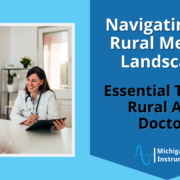
In rural landscapes, where communities often find themselves geographically isolated, healthcare becomes a vital resource. Rural area doctors play a crucial role in ensuring the well-being of these communities.
Operating in environments with unique challenges, these types of healthcare professionals may require a special set of skills and strategies tailored to the rural context.
In this blog, we’ll explore some essential tips for doctors in rural areas.
1. Community Engagement and Cultural Sensitivity
Rural communities often have distinct cultures and close-knit social structures. Building strong connections with the community is key to understanding their needs and earning their trust.
Being culturally sensitive helps doctors provide more personalized and effective care—fostering a sense of comfort among patients.
2. Versatility and Broad Skill Set
In rural settings, doctors may have to treat a diverse range of medical cases, largely due to limited access to specialized care doctors. These doctors need to be versatile and possess a broad skill set. This allows them to handle a variety of medical conditions, from basic primary care to emergency situations.
3. Emergency Preparedness
In remote locations, emergency response times tend to be longer than in urban areas. Rural doctors must do their best to be as prepared as possible for emergencies, equipped with the skills to stabilize patients before they can be transferred to another facility.
Maintaining updated emergency kits and conducting regular drills can enhance readiness.
4. Cultivating Strong Relationships with Local Health Workers
Like any other healthcare system, collaboration is key in rural areas. Building strong relationships with local nurses, paramedics, and other healthcare workers enhances the overall quality of care.
These connections can prove invaluable in emergencies and day-to-day patient management.
5. Understanding Socioeconomic Factors
Rural communities often face unique socio-economic challenges that can impact health outcomes. Being aware of these factors can allow doctors to tailor their advice and treatment plans to the specific needs and resources of the community.
This includes considering financial constraints, transportation issues, and access to healthy food options.
6. Patient Education and Preventive Care
Preventive care is especially important in rural areas since access to healthcare resources may be limited.
Doctors in rural areas should prioritize patient education, emphasizing the importance of healthy lifestyle choices and early detection of common health issues.
7. Self-Care and Professional Support
Working in rural areas can be emotionally and physically demanding. Rural doctors should prioritize self-care to avoid burnout.
Seeking support networks and participating in ongoing education opportunities can provide a sense of community and help manage the stressors associated with rural healthcare.
8. Telemedicine and Technology Integration
With the geographical challenges of rural areas, implementing technology is essential for overcoming distance barriers.
Telemedicine can be a valuable tool for remote consultations, follow-ups, prescription refills, and even education. Rural doctors should familiarize themselves with digital platforms and ensure their patients have access to the necessary technology.
Research into other kinds of technology may be the first step toward implementing new systems that can change the way your facility practices healthcare.
Michigan Instruments’ CPR devices are the most cost-effective devices on the market, which can be very beneficial to facilities that may need an extra hand.
For over 55 years, we’ve taken pride in our automated CPR machines that provide high-quality, uninterrupted CPR. Our Life-Stat and Thumper provide external chest compressions, giving your patient the best chance for survival and giving your healthcare staff the support they need.
Want to Learn More About Integrating New Medical Technology? Why Not Give Our Devices a Try?
Hospitals that use progressive technology like ours can enhance patient engagement in rural areas, improve quality of care, and optimize costs.
Our CPR devices can be your first step toward improving your hospital for both your patients and your staff.
Learn why so many facilities across the country (and around the world) trust our devices. Contact us to learn more about the numerous benefits our devices offer!




